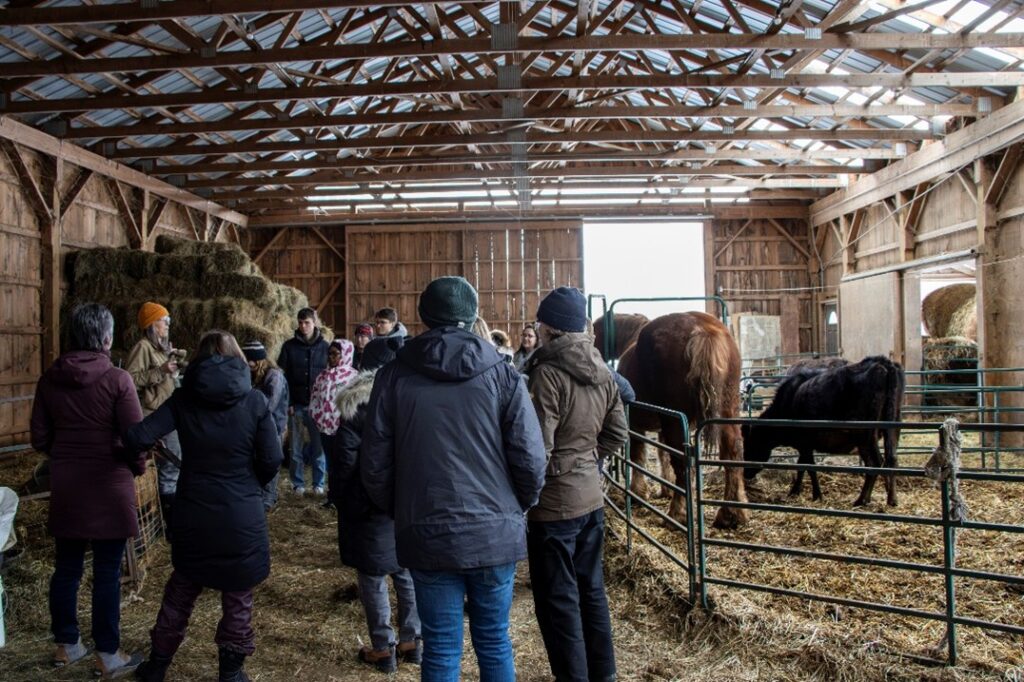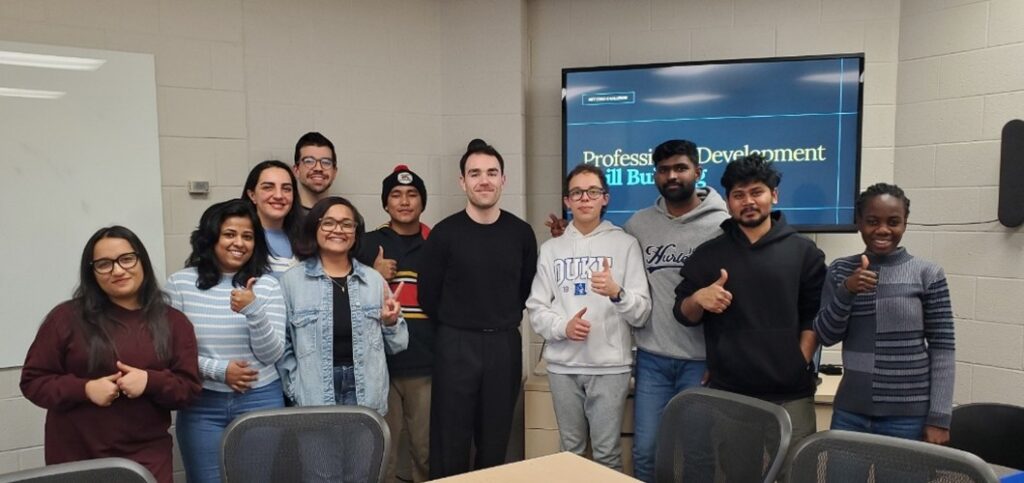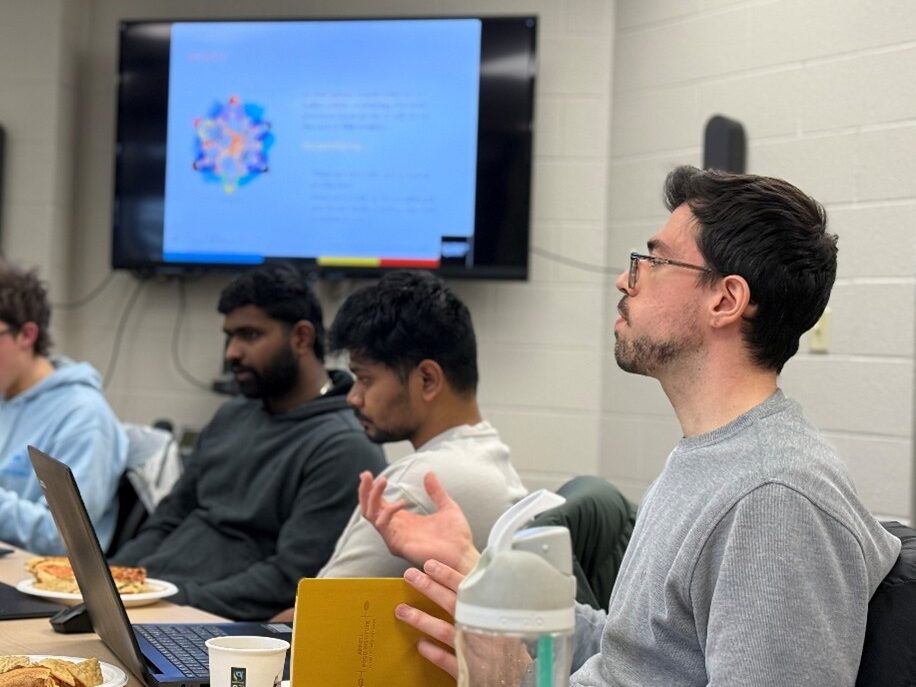With the Net-Zero Food Systems Challenge (NZFSC) well underway, graduate students at the University of Guelph have been using Life Cycle Assessment (LCA) tools to map carbon emissions of certain commodities across production, processing, and distribution through to consumer use and waste disposal. These commodities have been identified as Loblaw Companies Limited for having a direct impact on their sustainability goals and business performance.
The NZFSC is an experiential learning program that brings together graduate students across disciplines to develop solutions for a net-zero food system. The NZFSC is run by Arrell Food Institute (AFI) and the Ontario Agricultural College at the University of Guelph (U of G). It is supported financially by Loblaw Companies Limited.
As students prepare to translate their findings into actionable recommendations for their final presentation to Loblaw executives in mid-April, they have also been building the skills needed to present their insights effectively.
To support their work, students participated in a series of targeted workshops designed to deepen their understanding of food system complexities, strengthen professional competencies, and refine their communication strategies.
Each session focused on a key aspect of their work— the “Who,” “How,” “What,” and “Why.”
“The NZFSC workshops have been incredibly valuable in shaping my learning journey,” says Adya Dash, PhD Student in Water Resource Engineering at the University of Guelph. “The interactive nature of the workshops helped me develop confidence in public speaking, translating data-driven insights into compelling narratives, and adapting my communication style for different audiences”, she shares.
Continue reading to learn more about these workshops and how they supplemented student learning.
Life on the Farm: Understanding Producer’s Perspectives – The “Who”?

Led by Janice LeBoeuf, Strategic Initiatives Coordinator at AFI, this workshop provided students with critical insights into farmers’ perspectives and the realities for food producers.
Students explored the complexities of existing production systems, emphasizing the importance of considering feasibility for producers when proposing emission-reduction strategies.
The session also covered best practices for engaging with farmers, including how to make meaningful connections, identify the right contacts, and communicate effectively and respectfully.
By building this foundational knowledge, students gained the tools to ensure their recommendations are both impactful and practical to those they would impact the most.
Professional Development Skill Building: Engaging with Industry – The “How”?

Effective engagement with industry partners requires skills such as professionalism, effective communication, and networking.
This workshop, led by Jonathan Parkes, PhD Candidate and Sessional Lecturer at U of G, introduced the four C’s of professional success: Competence, Confidence, Collaboration, and Communication.
Students refined their elevator pitches, learning how to clearly articulate their unique skills, knowledge, and value to industry partners.
They also practiced networking strategies and persuasive communication techniques, emphasizing the importance of authenticity and adaptability.
Understanding how to present themselves effectively will help students navigate professional relationships in the future and ensure their work can be positioned for real-world impact.
Communicating Your Results – The “What”?

Led by Dr. Sadaf Mollaei, Arrell Chair in the Business of Food, this session addressed the critical challenge of translating complex scientific data into actionable insights for businesses.
While LCA data provides valuable information on carbon emissions, it must be communicated in a way that aligns with industry priorities such as consumer demand, regulatory compliance, and cost-savings.
Dr. Mollaei emphasized the need to simplify complex information and use terminology that is relevant to the audience.
The session introduced the “So What?” framework, and students explored the importance of tailoring their messaging to their audience, structuring recommendations around a company’s mission, vision, and market trends.
By focusing on clear and compelling communication, students learned how to ensure their research has a meaningful impact on decision-making.
Knowledge Mobilization for our Industry Partner: Guided Graphic Illustration – The “Why”?

In the final workshop led by Alex Sawatzky, Creative Advisor at AFI, students brought together their learning to build a cohesive narrative for their presentations to Loblaw executives. They synthesized their findings, reflecting on how their use of LCA software informed their recommendations.
This session emphasized the importance of storytelling in business communication—structuring their insights into a compelling narrative that effectively conveys the value of their work.
Students discussed how to succinctly present their research while ensuring that their justifications are clear and well-supported.
By engaging in this reflective process, they strengthened their ability to communicate the significance of their findings and guide business decisions with evidence-based insights.
Looking Ahead
NZFSC provides students with a unique opportunity to apply their academic expertise to real-world industry challenges.
Through these workshops, they have developed a strong foundation in producer engagement, professionalism, effective communication, and strategic storytelling. Furthermore, students will receive a Net-Zero Food Systems micro-credential from U of G upon completion of the workshops. This will allow students to demonstrate their commitment to finding sustainable solutions to food system challenges, particularly in partnership with industry partners.
As they prepare for their final presentations to Loblaw executives, they are equipped with the skills and knowledge to maximize the impact of their findings, helping to reduce greenhouse gas emissions, and contributing to a more sustainable future.
Education at AFI

Arrell Food Institute is providing innovative opportunities for students to collaborate across disciplines, to develop entrepreneurship and communication skills, and to put these skills into practice by tackling real-world problems. We strongly believe that an experiential learning approach is key to training the next generation of leaders and preparing them for an ever-shifting agricultural landscape.